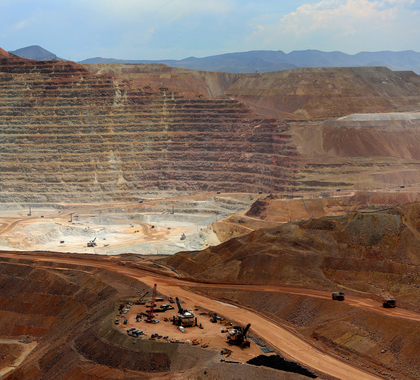The U.S. Bureau of Land Management (BLM) seems ready to approve a proposal to expand a uranium mine located on federal lands in Utah.
Energy Fuels Resources’ (EFR) Daneros Mine began producing uranium ore in 2010, yielding 123,000 tons before shutting down in October 2012, when the price of uranium fell after the Fukushima nuclear plant meltdown. In anticipation of restarting operations at the mine, EFR petitioned BLM, “to modify its mine plan to bump production from 100,000 tons of ore over seven years to 500,000 tons over 20 years, along with an increase in its mine footprint from 4.5 to 46 acres.”
In June, BLM released a draft environmental assessment indicating the mine would have no significant harmful environmental impact. The draft assessment also revealed BLM expects to approve the mine expansion.
According to BLM, in order to minimize the amount of surface disturbance at any one time, Daneros mining would be completed in phases, with reclamation of areas no longer needed for operations being carried out concurrent with operations on newly opened areas. At the end of the operations, EFR would reclaim or restore all disturbed land to natural or economically usable conditions.
EFR views the expansion of Daneros as a helpful step toward achieving U.S. energy independence, which it says it will to achieve by providing a new source of domestic uranium.
At the end of 2013, the United States’ 100 operating nuclear power plants were consuming uranium fuels at a rate of 47 million pounds per year. The United States only produces 4.6 million pounds per year, with the remaining 90 percent coming from overseas sources.
Mine Policy Lacks Transparency
Utah State Rep. Ken Ivory (R-West Jordan) says he would like to see expanded uranium mining in Utah and does not object to the Daneros expansion. Ivory also says he would like to know more about how the decision was made to permit EFR’s proposal, because he says the federal decision-making process has not been clear or consistent in recent years.
“Federal uranium and energy policies change so often and so arbitrarily that, to paraphrase James Madison from Federalist Paper No. 62, ‘no man who knows what the [policy] is today can guess what it will be tomorrow,'” Ivory said. “In 2012, then Interior Secretary Ken Salazar arbitrarily banned mining of the uranium rich lands of Northern Arizona without input from local leaders or regard for the impact it will have on Arizona and Utah communities and families, while former Secretary of State Hillary Clinton approved the sale of nearly half the nation’s uranium output to Russian interests at the same time these Russian interests contributed handsomely to the Clinton Foundation.
“With ever increasing limits on access to natural resources on federal lands under the Obama administration, one is left asking why this proposal was approved,” Ivory said. “Are we really supposed to believe any national uranium policy or practice is transparent, fair, and reasonable?”
Michael McGrady ([email protected]) writes from Colorado Springs, Colorado.




